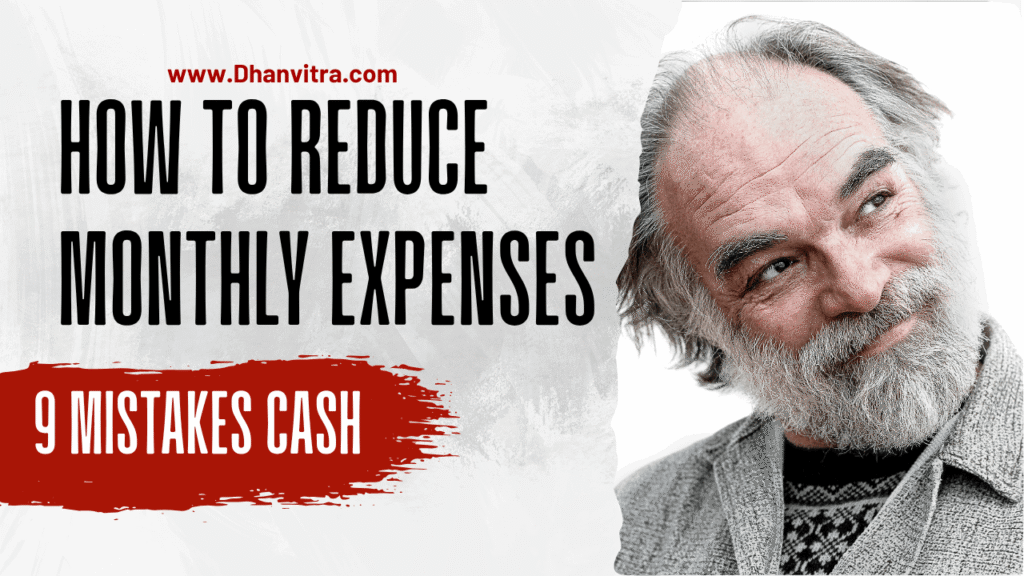
Welcome to Dhanvitra, your go-to guide for smart money habits and practical tips to stretch every rupee. Let’s face it—managing money isn’t always easy. Bills pile up, unexpected expenses pop out of nowhere, and somehow, by the end of the month, your wallet feels lighter than it should. How to Reduce Monthly Expenses.
If you’ve ever wondered why your hard-earned cash disappears so fast, you’re not alone. Many of us make small mistakes every month that quietly drain our finances. These mistakes aren’t always obvious, but they add up quickly. The good news? Once you spot them, you can take control and start saving without feeling stressed or restricted.
In this article, we’ll dive deep into 9 common money mistakes that silently eat away at your monthly budget. From overspending on dining out to ignoring subscriptions you don’t use, we’ll cover it all. And don’t worry—we’ll also share simple, actionable tips so you can fix these leaks and keep more money in your pocket.
By the end of this guide, you’ll have a clear roadmap to reduce monthly expenses, make smarter financial choices, and feel more confident about your money every single month. So, let’s get started and stop letting small mistakes steal your cash!
How to Reduce Monthly Expenses
Mistake 1: Ignoring a Budget
Skipping a budget might feel freeing at first, but it’s like sailing without a map. You never really know where your money goes. When you ignore budgeting, small leaks in your finances pile up silently. One day, you check your account and wonder how you spent so much without even noticing.
Creating a budget doesn’t have to be complicated. Write down your rent, groceries, utilities, and even those tiny coffee splurges. Seeing it on paper gives you a clear picture. Next, separate your spending into essentials and non-essentials. Essentials are the things you can’t avoid, like rent or bills. Non-essentials are optional, like online shopping or takeout meals.
The key is to assign limits. Give yourself a set amount for groceries, entertainment, and other categories. This way, you spend intentionally instead of impulsively. Think of your budget as a personal guide, not a restriction. It shows you where to cut back and where you can afford a little treat without guilt.
Mistake 2: Overusing Credit Cards
Credit cards feel like magic. You swipe, and the purchase is done. But magic comes at a price. If you only pay the minimum every month, interest creeps in like a silent thief. That $50 dinner can cost $70 or more if carried over time.
Overusing credit cards creates a false sense of security. You may feel rich because you can buy now and pay later, but soon your debt grows faster than you realize. Even one or two late payments can affect your credit score and lead to more fees.
The smart way to use credit cards is to treat them like a debit card. Keep track of due dates and pay the full balance to avoid interest. If you have multiple cards, focus on the one with the best rewards or lowest interest. Treating credit cards responsibly gives you the convenience without the hidden costs.
Mistake 3: Subscribing to Unused Services
Streaming platforms, app memberships, magazine subscriptions—they all seem small, but they add up. Many of us sign up on a whim and forget about them. That $10-a-month service might feel harmless, but across multiple subscriptions, it can drain hundreds annually.
The problem is we rarely check our statements. Those silent charges slip by unnoticed, eating into your budget. A quick audit can save a surprising amount. Go through your bank or credit card statements and highlight all recurring charges. Ask yourself: “Do I really use this? Could I live without it?” Cancel the ones you don’t need.
You’ll be amazed at how much free cash appears when you cut out forgotten subscriptions. It’s not about denying yourself; it’s about being intentional with what you pay for.
Mistake 4: Eating Out Too Often
Eating out feels convenient, right? But that convenience has a cost. Every lunch, coffee, or dinner adds up faster than you realize. Restaurants often charge more for portion sizes, ambiance, and service than for the actual food.
Cooking at home might feel like a chore, but it saves a lot of money. Even simple meal prepping for the week can cut your food costs in half. Buy ingredients in bulk, cook once, and store portions for later. You’ll eat healthier and save a ton.
Eating out occasionally is fine—it’s about balance. Treat restaurants as a special occasion, not a daily habit. Small changes, like brewing your morning coffee or packing lunches, can make a huge difference at the end of the month.
Mistake 5: Paying for Brand Names Over Generics
It’s easy to fall for the shiny packaging or famous logos. But in many cases, generic or store-brand products offer the same quality for a fraction of the price. That fancy cereal or toothpaste isn’t always worth the extra dollars.
Switching to generics doesn’t mean compromising. Often, the ingredients and performance are nearly identical to the branded version. By making small swaps in groceries, personal care, and household items, you can save a surprising amount over the year.
Think of it like this: every dollar saved adds up. It’s not about being cheap; it’s about being smart with your choices. Over time, those small savings can fund larger goals, such as vacations, investments, or even a rainy-day fund.
Mistake 6: Ignoring Utility Bills
Most of us think that utility bills are fixed and unavoidable. However, the truth is that small habits can cause these bills to skyrocket without you even noticing. Leaving lights on, letting the tap run while brushing your teeth, or keeping your air conditioner running all day can silently drain your money. Many people ignore these small leaks because each expense feels tiny. But over a month, they add up to a significant chunk of your income.
Start by monitoring your electricity, water, and gas usage. Turn off appliances when not in use, unplug devices, and switch to energy-efficient options where possible. Even small changes, like washing clothes in cold water or sealing drafts in your windows, can reduce your bills. Think of it this way: every penny saved here is money that stays in your pocket instead of vanishing into unseen expenses.
Mistake 7: Shopping Without a List or Plan
Shopping without a plan is like wandering through a candy store blindfolded—you will buy things you don’t need. Impulse buying is one of the sneakiest ways to drain your cash. You go in for bread and milk, and suddenly, your cart is full of snacks, gadgets, and unnecessary items.
To avoid this, make a shopping list before you leave home. Stick to it. Planning meals for the week can also help. When you know what you need, you avoid temptation and save money. Online shopping can be even trickier because everything seems like a “deal.” So, pause and ask yourself: “Do I really need this, or am I just tempted?” This simple habit can drastically cut down on wasted spending.
Mistake 8: Neglecting Debt Payments
Ignoring debt is like ignoring a leaking roof—it won’t fix itself. Every day you delay paying off a loan or credit card balance, interest piles up, quietly draining your money. Minimum payments are a trap; they give a false sense of control while the debt quietly grows.
To tackle this, prioritize high-interest debts first. Create a repayment plan and stick to it. Even small extra payments can reduce the total interest you pay over time. Paying debts on time not only frees your money faster but also improves your financial confidence. Imagine waking up without the weight of lingering debt—it’s freeing and motivating.
Mistake 9: Overlooking Insurance Options
Many people pay for insurance and never review it. You might be paying for a policy you no longer need or missing cheaper alternatives. Insurance is essential, but overpaying is a common money leak.
Take the time to review your policies annually. Compare options, ask for discounts, and check if bundling policies could save you money. Sometimes switching providers or adjusting coverage can significantly lower your monthly expenses without sacrificing protection. Remember, insurance should protect you, not drain your wallet.
Bonus Tips to Reduce Monthly Expenses
Cutting costs doesn’t always mean drastic lifestyle changes. Often, it’s about small, smart moves. Start tracking your spending—it helps you see where money disappears. Apps or simple spreadsheets can do this. You’ll be surprised how much you waste on minor habits.
Another tip is to consolidate purchases. Buying in bulk for essentials can save money. Cooking at home instead of eating out, taking advantage of free activities, and setting up automatic savings can create a healthy financial cushion. Even combining small savings—skipping one takeaway meal a week or canceling a rarely used subscription—can add up over time. The key is consistency. Each small change contributes to a larger financial impact.
How to Track Your Savings Progress
Tracking your savings doesn’t have to be complicated. In fact, it can be surprisingly motivating. The first step is knowing exactly where your money is going. Open a simple spreadsheet or use a budgeting app. List your income, fixed expenses, and discretionary spending. Then, track how much you save each month.
Don’t just look at the numbers once; check them weekly. This gives you a clear picture of your progress and helps you spot areas where you can save more. Even small amounts count. Saving $50 one month might not feel like much, but over a year, that’s $600. Seeing your progress in black and white makes the effort real.
Celebrate milestones. If you reach a savings goal, treat yourself—but keep it small. The key is to make tracking fun, not stressful. When you see your savings grow, it motivates you to keep going.
The Psychology Behind Overspending
Overspending is rarely about money—it’s about emotions. Stress, boredom, or the desire to impress others can trigger unnecessary purchases. Sometimes, it’s as simple as seeing a “sale” sign and feeling like you’re missing out.
Understanding your triggers is the first step. Ask yourself why you buy what you buy. Is it necessary, or is it an emotional reaction? Awareness helps break the cycle.
Creating a Sustainable Money Mindset
A sustainable money mindset isn’t about extreme frugality. It’s about making choices that feel good today and tomorrow. Focus on long-term benefits rather than instant gratification. Small changes, like cooking at home or canceling a subscription you never use, add up over time.
It’s also about balance. Don’t deprive yourself of everything you enjoy. Allow occasional treats, but plan for them. Think of money management as a muscle—the more you practice, the stronger and smarter you get.
Set goals, track your progress, and remind yourself why you’re saving. Over time, these habits become natural. You start thinking, “How can I spend wisely and save more?” instead of constantly asking, “Where did all my money go?”
Conclusion
Reducing monthly expenses isn’t about cutting every corner or living an austere life. It’s about awareness, smart choices, and small, consistent actions. By avoiding common mistakes like ignoring budgets, overusing credit, and overspending on impulse, you can keep more money in your pocket.
Track your savings, understand your spending triggers, and build a money mindset that works for you. Remember, every dollar you save today is a step toward financial freedom tomorrow. It’s not about perfection—it’s about progress. Start small, stay consistent, and watch your financial confidence grow.
FAQs
What’s the easiest way to start budgeting?
Start simple. List all your income and monthly expenses. Track every expense for a month, then identify areas to cut back. You don’t need a fancy app—just awareness is enough.
How can I avoid impulse shopping?
Pause before buying. Wait 24 hours for non-essential items. Ask yourself if you really need it or if it’s just an emotional purchase. Awareness is your best weapon.
Are generic products really better?
Generics often have the same quality as brand names at a lower price. Switching can save you a lot over time without sacrificing quality.
How do I find cheaper insurance options?
Review your current policy yearly. Compare offers online and don’t hesitate to switch. Sometimes, small changes in coverage can save big money.
Can small savings really make a difference?
Absolutely. Saving even a few dollars consistently adds up. Over months and years, small habits create substantial financial security.









